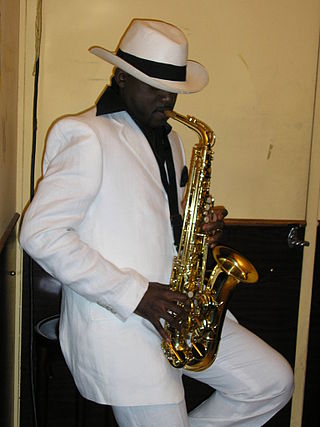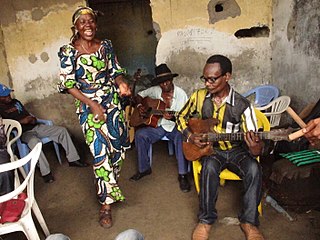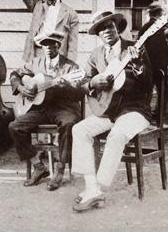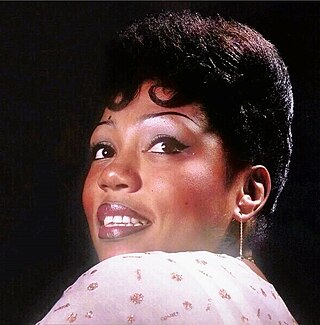The term rumba may refer to a variety of unrelated music styles. Originally, "rumba" was used as a synonym for "party" in northern Cuba, and by the late 19th century it was used to denote the complex of secular music styles known as Cuban rumba. Since the early 20th century the term has been used in different countries to refer to distinct styles of music and dance, most of which are only tangentially related to the original Cuban rumba, if at all. The vague etymological origin of the term rumba, as well as its interchangeable use with guaracha in settings such as bufo theatre, is largely responsible for such worldwide polysemy of the term. In addition, "rumba" was the primary marketing term for Cuban music in North America, as well as West and Central Africa, during much of the 20th century, before the rise of mambo, pachanga and salsa.

Congolese music is one of the most influential music forms of the African continent. Since the 1930s, Congolese musicians have had a huge impact on the African musical scene and elsewhere. Many contemporary genres of music, such as Kenyan Benga and Colombian Champeta, have been heavily influenced by Congolese music. In 2021, Congolese rumba joined other living traditions such as Jamaican reggae music and Cuban rumba on UNESCO's "intangible cultural heritage of humanity" list.
The term Congolese music can refer to the music of two countries:

Soukous is a genre of dance music originating from the Democratic Republic of the Congo and the Republic of the Congo. It derived from Congolese rumba in the 1960s, with faster dance rhythms and bright, intricate guitar improvisation, and gained popularity in the 1980s in France. Although often used by journalists as a synonym for Congolese rumba, both the music and dance associated with soukous differ from more traditional rumba, especially in its higher tempo and longer dance sequences.

The Republic of the Congo is an African nation with close musical ties to its neighbor, the Democratic Republic of the Congo. The Democratic Republic of the Congo's homegrown pop music, soukous, is popular across the border, and musicians from both countries have fluidly travelled throughout the region playing similarly styled music, including Nino Malapet and Jean Serge Essous. Brazzaville had a major music scene until unrest in the late 1990s, and produced popular bands like Extra Musica and Bantous de la Capitale that played an integral role in the development of soukous and other styles of Congolese popular music. The Hip-Hop group "Bisso na Bisso" also hails from Congo-Brazzaville.
African popular music, like African traditional music, is vast and varied. Most contemporary genres of African popular music build on cross-pollination with Western popular music. Many genres of popular music like blues, jazz, salsa, zouk, and rumba derive to varying degrees on musical traditions from Africa, taken to the Americas by enslaved Africans. These rhythms and sounds have subsequently been adapted by newer genres like rock, and rhythm and blues. Likewise, African popular music has adopted elements, particularly the musical instruments and recording studio techniques of the Western music industry. The term does not refer to a specific style or sound but is used as a general term for African popular music.

Kanda Bongo Man is a Congolese soukous musician born in Inongo, Democratic Republic of the Congo. He became the singer for Orchestra Belle Mambo in 1973, developing a sound influenced by Tabu Ley. His solo career only started to take off after he moved in 1979 to Paris, where his music started to incorporate elements of then-vibrant zouk music popularized by Kassav. His first solo albums, Iyole in 1981 and Djessy in 1982, were hits.

Marie-Claire Mboyo Moseka, known professionally as M'bilia Bel, is a Congolese rumba, soukous, and world music singer and songwriter. She is known as the "Queen of African Rumba". She rose to fame after first being discovered by Sam Manguana and later by Tabu Ley Rochereau who helped her gain confidence, master her powerful soprano voice, and achieve acclaim as one of the best Congolese female singers.
Pascal-Emmanuel Sinamoyi Tabu, better known as Tabu Ley Rochereau, was a leading African rumba singer-songwriter from the Democratic Republic of the Congo. He was the leader of Orchestre Afrisa International, as well as one of Africa's most influential vocalists and prolific songwriters. Along with guitarist Dr Nico Kasanda, Tabu Ley pioneered soukous and internationalised his music by fusing elements of Congolese folk music with Cuban, Caribbean and Latin American rumba. He has been described as "the Congolese personality who, along with Mobutu, marked Africa's 20th century history." He was dubbed "the African Elvis" by the Los Angeles Times. After the fall of the Mobutu regime, Tabu Ley also pursued a political career. His musical career ran parallel to the other great Congolese rhumba bandleader and rival Franco Luambo Makiadi who ran the band TPOK Jazz throughout the 1960s, 1970s and '80s.

Ndombolo, also known as dombolo, is a genre of dance music originating in the Democratic Republic of the Congo. Derived from soukous in the 1990s, with fast-paced hip-swaying dance rhythms, often accompanied by upbeat, percussion-driven music, the style became widespread in the mid-1990s and the subsequent decade, dominating dancefloors in central, eastern, and western Africa. It inspired West African popular music, coupé-décalé, Kuduro, and East African dance music.

Congolese rumba, also known as African rumba, is a dance music genre originating from the Democratic Republic of the Congo and the Republic of the Congo. With its rhythms, melodies, and lyrics, Congolese rumba has gained global recognition and remains an integral part of African music heritage. In December 2021, it was added to the UNESCO list of intangible cultural heritage.

Louis Albert William Longomba, known professionally as Awilo Longomba, is a Congolese soukous singer, composer, drummer, songwriter, dancer, and producer. The second child of Vicky Longomba and maternal uncle of French player Claude Makélélé, Longomba is known for his avant-garde "techno-soukous" and performances.
Saturnin Pandi (1932–1996) was a soukous recording artist, conga player, in the Republic of the Congo (Congo-Brazzaville) and in the Democratic Republic of the Congo (DRC). He was one of the founding members of the soukous band TPOK Jazz, formed in 1956, led by François Luambo Makiadi, which dominated the Congolese music scene from the 1950s through the 1980s. He was also a member of the Bantous de la Capitale, formed, in Brazzaville in 1959, led by Jean Serge Essous.

A guajeo is a typical Cuban ostinato melody, most often consisting of arpeggiated chords in syncopated patterns. Some musicians only use the term guajeo for ostinato patterns played specifically by a tres, piano, an instrument of the violin family, or saxophones. Piano guajeos are one of the most recognizable elements of modern-day salsa. Piano guajeos are also known as montunos in North America, or tumbaos in the contemporary Cuban dance music timba.

Elisabeth Finant, cognomenously known as Abeti Fina‐Masikini or simply Abeti Masikini, was a Congolese singer, composer, bandleader, and philanthropist. With a nearly three-decades-long career, she was a significant figure in 20th-century Congolese and African popular music. Often referred to as the "Queen of Soukous," she is noted for advocating gender equality, modernizing Congolese music, and inspiring successive generations of musicians. Her band, Les Redoutables, was a launching pad for numerous female artists.
Abeti Masikini: Le Combat d'Une Femme is a 2015 Congolese documentary film about the Congolese Diva and soukous star Abeti Masikini who fought for gender equality in the music industry during the 1970s. The film was directed by Ne Kunda Nlaba, who produced and wrote the film with Laura Kutika.
Afrobeats is an umbrella term to describe popular music from West Africa and the diaspora that initially developed in Nigeria, Ghana, and the UK in the 2000s and 2010s. Afrobeats is less of a style per se, and more of a descriptor for the fusion of sounds flowing out of Nigeria and Ghana. Genres such as hiplife, jùjú music, highlife and naija beats, among others, were amalgamated under the "Afrobeats" umbrella.
Aurlus Mabélé was a Congolese singer and composer. He was commonly referred to as the "King of Soukous".

Bolia Matundu, better known mononymously by his stage name BM or simply BM Artist, is a Congolese-born, London-based ndombolo singer, composer, songwriter, dancer, and record producer. With a mellifluous vocal timbre, he is known for his high-energy dance moves and emphatic beats.










